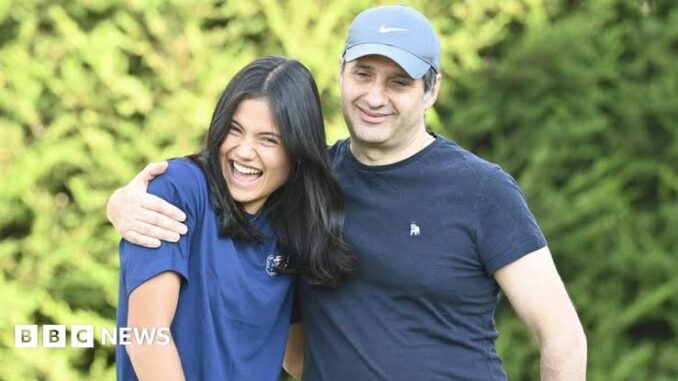
The enigmatic coaching carousel surrounding Emma Raducanu has once again taken center stage, with recent revelations offering a candid glimpse into the perspective of her father, Ian Raducanu, a figure widely regarded as highly influential in her career decisions. While the British tennis star has consistently opted for short-term coaching arrangements, the insights from her former coaches shed light on the dynamics at play, revealing what some perceive as Ian Raducanu’s unwavering, almost exacting, approach to his daughter’s development.
Emma Raducanu, now 22, has been on a relentless quest to rediscover the form that saw her clinch the US Open title as a qualifier in 2021. Her journey since that historic triumph has been marked by a series of injuries and, notably, a frequent rotation of coaches. This pattern, while often raising eyebrows in the traditionally stable world of tennis coaching, appears to be deeply rooted in the philosophy upheld by her inner circle, particularly her father.
Most recently, Emma briefly collaborated with Slovak coach Vladimir Platenik. Their partnership, which lasted a mere 10 days and concluded on the eve of the Miami Open, initially seemed promising. Platenik himself recounted Ian Raducanu’s enthusiastic feedback during their brief period together. “I was really happy, because I never heard a father thank me so many times that he thanked me after the practices,” Platenik shared in a candid interview. He further elaborated on Ian’s satisfaction, stating, “He was like, ‘Wow, you are doing everything what I wish a coach would do with my daughter, and she was improving’.”
Despite this seemingly positive initial assessment, the partnership was abruptly curtailed, a decision that reportedly caught both Platenik and Ian Raducanu by surprise. Platenik acknowledged the immense pressure Emma was under, especially following the departure of her previous coach, Nick Cavaday, due to health reasons. He reflected on the amicable nature of their parting, emphasizing that there were “absolutely no bad feelings” and that he hopes to work with Emma again in the future.
However, a deeper look into the past suggests a consistent pattern of highly analytical and demanding expectations from Ian Raducanu. Tennis insiders have described him as possessing a “constant thirst for information” but also as being “obsessed with peripheral detail.” Adjectives used to portray him include “demanding, analytical, opinionated and personable,” painting a picture of a father deeply invested, perhaps even micro-managing, his daughter’s technical and tactical evolution. Some reports from earlier in Emma’s career even alluded to emotional pressure, speaking of “Emma’s tears and Ian’s periods of silence.” While such claims are difficult to verify, they contribute to the perception of a relentless pursuit of perfection that underpins the constant coaching changes.
Indeed, Emma herself has alluded to this exacting standard. In the past, she has stated, “I ask my coaches a lot of questions. On certain occasions they haven’t been able to keep up with the questions I’ve asked and maybe that’s why it ended.” This suggests a constant search for new insights and methodologies, perhaps reflecting her father’s “analytical” nature and his desire for continuous, rapid improvement.
The current situation sees Emma reuniting with Mark Petchey, who previously coached her as a junior and briefly during the COVID-19 pandemic. This informal arrangement, which sees Petchey juggling his coaching duties with commentary commitments, appears to be working for Raducanu. Her recent upturn in form, winning eight of 11 matches since their reunion, has propelled her back into the world’s top 50. This decision aligns with Emma’s expressed desire to work with people she trusts, a sentiment echoed by Petchey’s commitment to focusing exclusively on her.
Ultimately, the consistent pattern of short-lived coaching partnerships, coupled with the insights from former coaches like Platenik, points to a clear philosophy emanating from the Raducanu camp, notably from Ian. It’s a philosophy driven by an intense desire for perfection and an unyielding pursuit of the ideal coaching solution, even if it means frequent changes. While this approach has drawn criticism for its lack of stability, it is, in their view, the path to unlocking Emma’s full potential and, perhaps, guiding her to another Grand Slam title. Her father’s “true colors,” in this context, appear to be those of an uncompromising and deeply involved architect of her tennis journey, forever seeking the next edge.
Leave a Reply